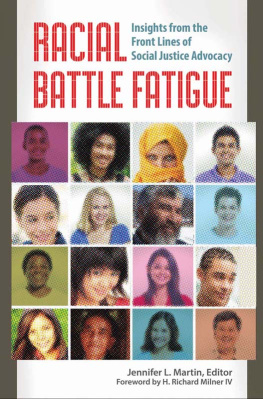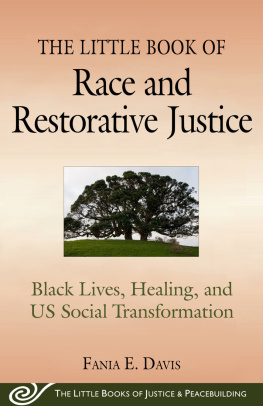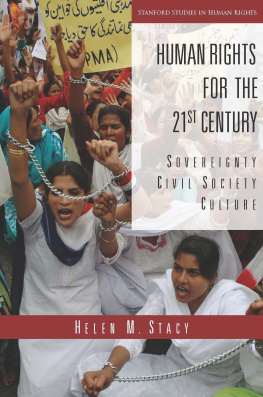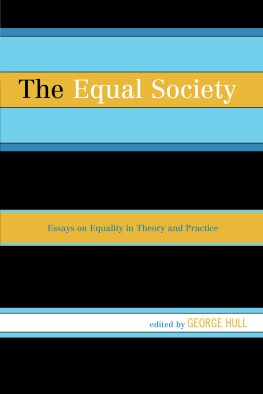This book is dedicated to reinvention. Often, we follow someone elses light to freedom, and maybe later we learn to lift a light for othersnot for personal gain, nor to be better than somebody, but to show that certain strange paths stretch into the future too. There are gifts to share. No one is beyond love.
When languagewhether printed or spoken or livedis put to difficult or confusing experiences, were not just reinventing ourselves. We enliven the culture that reaches both forward and back into other generations. Right now, we are somewhere in the past, saving our grandparents lives. We are somewhere in the future saying thank you to ourselves, even as we turn to look further into what cannot yet be known.
I want the freedom to carve and chisel my own face, to staunch the bleeding with ashes, to fashion my own gods out of my entrails. Gloria Anzaldua
Language takes us to the bigness of ourselves, our origins, our universe.
We choose our kuleana . I make sure that whoever comes into our learning, we give them a safe space to learn and we also hold them accountable. Kumu Leialoha Ilae-Kaleimamahu
Love is a combination of care, commitment, knowledge, responsibility, respect and trust. bell hooks
Optimism is a strategy for making a better future. Because unless you believe that the future can be better, you are unlikely to step up and take responsibility for making it so. Noam Chomsky
Introduction
Im sometimes asked when will there be enough [women on the Supreme Court]? And I say When there are nine. People are shocked. But thered been nine men, and nobodys ever raised a question about that.
Ruth Bader Ginsberg, Supreme Court justice
Its not so much that we didnt know, as that we didnt acknowledge the meaning of what we knew.
That which is common comes to be seen as normal. Occasionally, someone points to an obvious fact that had been rendered invisible. Looking at a picture of U.S. presidents, for instance, its possible to note that theyre all men or that only one is a person of color. Weve seen the picture of the presidents in our elementary school classrooms and in online memes and in our minds for our entire lives. And whether or not one agrees with the power of the office, with the dominion of its values, there is a broader message being delivered in its homogeneity. A true message that perpetuates itself silently in the image and loudly in language, both subtly and overtly in every micro-interaction of government, business, and religion: none but white men are truly welcome here.
The issue here is how we make meaning of what we see. If one believeseven passively or unconsciouslythat women are inferior leaders or that people of color are inferior humans, then that lack of representation is actually desirable. That would be conscious bias. If one associates young Black men and women with crime, considering them a constant potential source of violence, then punitiveand even violentpolicing might make sense. Yes, humans can actually hold the values of human equality sacred in the abstract without acting to dismantle the systems and actions that support our deeper biases, comforts, and associations.
New meanings dont just suddenly come into being. At the moment chattel slavery was abolished in the United States, slaveholders did not suddenly change their views on the humanity of those they held in bondage. They were being politically forced to change a practice but not an ideology. Every generation of white people in the United States since then has navigated the meaning of equality parallel to the ideologies of white supremacy and what it means to make and hold wealth. We are a nation obsessed with the accumulation of wealth as a measure of intelligence, hard work, and fortitude, despite that accumulation always having relied on the theft of land and labor of Black and brown people. We used to know that we diminish the humanity of Black and brown people. Now we hide what we know from ourselves.
The widespread 2020 marches and demands to address police brutality had to prompt change, and, because of how capital has come to supersede the worth of some humans, property damage was probably also needed before individuals and the systems that represent them were capable of hearing. Time will tell whether the positive changes in policing catalyzed by the events following George Floyds death will hold or be transformed, as in the past, into new policies that enforce longstanding U.S. values. At this writing, abolition and a redistribution of resources toward true community safety have not been adequately explored. The old scriptsabout who is worthy, intelligent, capablestay with us for generations. We install new meanings in the culture through stories, through listening, through shared experiences, and by becoming significant in one anothers lives. Massive public outcry and the amplification of marginalized voices can help us to listen and pay attention.
To anyone paying attention, it has also been obvious, ignored, and completely wrong that so many children are abused and that so many women are sexually assaulted, threatened, harassed, and marginalized. White supremacy, gender nonconformity, and the daily, persistent ridicule and dismissal of fat and disabled bodies are still difficult to discuss socially. We know, but we dont want to acknowledge what we know. Studies abound showing that people of color, fat people, women, and disabled people all suffer biases in the workplace, in law, in education, and in healthcare. Yet these biases persist because we dont discuss them publicly and we dont sanction the perpetrators of abuse on a regular basis. Few openly believe that child abuse and rape are okay and should not be stopped and addressed Yet the patterns in the data on how we punish those crimes show very different and distinct cultural values. The fact that we do not actually focus on stopping abusers and addressing their actions as part of communities that deserve safety and care shows that the culture is not interested in disturbing male dominion.
The #metoo movement has propelled conversations about sexual assault into broader contexts much as the recent Black Lives Matter protests have increased conversations about police brutality. My step-mother, in her seventies, used the #metoo movement as a time to disclose her own experiences with sexual assault, on social media. Ive been writing and speaking about these topics for years, and, though shes been interested in my work, it wasnt enough to prompt her disclosure. She came forward because a public conversation had progressed to the point where solidarity and bravery, rather than fear, prevailed.
Progress is hard because we snap back to what comforts usor at least whats familiarlike tight little rubber bands. However, maybe its possible for greater elasticity to emerge at the intersections of supremacist issues, and for daily, individual practices with language and interaction to encourage lasting change.
Culture is shifting in multiple directions at once with regard to revelations about how white men have organized human systems to their benefit for generations. Those men with fewer financial resources find it difficult to discern their privilege and too readily become foot soldiers in the war to maintain the status quo of resource distribution. This paradox doesnt reveal those men as idiots; it shows how deeply attached to identity we are, as humans. Identification with white supremacist values is on the rise. As the gap between rich and poor has widened in the United States (as a result of social policies, not the natural order of capitalism), discussions about appearance/identity privilege become quickly contentious. Yet harbingers of change like Alexandra Ocasio-Cortez are becoming public figures and making a claim to long-held power structures. Much maligned and resilient, she is showing shes not afraid of hard work and learning. Some dont hesitate to say that because she is young, or female or Latinx that she knows and can do nothing. Clearly, this is also profoundly and completely wrong. In addition to being capable of ignoring the obvious, we are also capable of stating the opposite of truth as fact.










